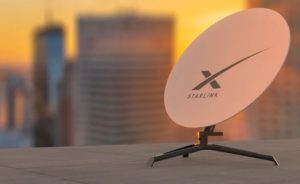
By Ibrahim Osman
In Nigeria with a landmass in excess of 923,768 km2 (356,669 sq mi), Starlink is increasingly becoming synonymous with stable, ‘everywhere’ Internet access, and at affordable rates.
RELATED: Starlink outpaces competitors in Nigeria, rest of Africa
The story is the same across Africa whether Mozambique, Rwanda, or Southern parts of the continent where Elon Musk’ Starlink has opened shop changing the game and reworking competition in favour of consumers.
Starlink is officially available in about eight African countries and is set to rollout in dozens of others. The attraction is robustness of service, ease of deployment and increasingly, the price dip as the service gain traction.
The carrot is price with robust service
This month in Nigeria, Konga – Nigeria is leading composite eCommerce group and the only official Starlink Shop-in-shop eCommerce partner announced a 50% price cut to discourage patronage of grey products not supported by Starlink. This is a testament to the growing acceptance of Starlink and how the market will do anything including patronising grew market to access the service.
Starlink simply crashed the price of its internet router, which was being sold for N800, 000 for N440, 000. Its monthly subscription remains unchanged at N38, 000 per month allowing for more individuals, corporate entities and Small Medium Enterprises (SMEs) to sign into Starlink.
Last November, two ISPs selling Starlink on a roaming package in South Africa announced a 41% price cut to outsmart the grey market. Whether in Kenya or in Zambia, the introduction of Starlink services in Africa marks is helping to fast-track widespread internet access aiming to narrow the digital gap through its innovative technology.
This satellite based internet service, renowned for its user approach to using everyday household gadgets, is set to revolutionize connectivity particularly when contrasted with traditional VSAT systems. Its primary goal is to make high-speed internet readily available to all mirroring the simplicity of purchasing a device off the shelf in countries like Nigeria.
Speed matters- Starlink is outpacing competitors
Starlink is outpacing competitors in Nigeria and rest of Africa. A Q2 2023 Speedtest data by Ookla analysis of satellite providers in Africa, Europe, and Oceania shows Starlink rules the market in terms of speed.
The report covers satellite operators including SpaceX’s Starlink, Viasat, and Skylogic and reveals that in Africa Starlink, which first berthed on the continent with a Nigerian launch is outpacing its competitors on speed.
In smaller African countries like Sierra Leone, Guinea and Liberia where affordable Internet has remained a nightmare, Starlink holds the ace to drive change across the entire spectrum of regulation and network operation
The report notes: “Starlink, which first launched on the African continent in Nigeria this past January, is showing intriguing early results. Speedtest Intelligence showed that Starlink in Nigeria had a faster median download speeds than all aggregate fixed broadband providers combined at 63.69 Mbps to 15.60 Mbps during Q2 2023. Upload speeds were more similar during the same time period with Starlink at 13.72 Mbps and the aggregate of all fixed broadband providers combined at 10.60 Mbps. Starlink did have a marginally higher multi-server latency at 55.88 ms to 50.26 ms during Q2 2023.”
The trend has remained largely unchanged since the 2023 analysis.
Licensed to change the game: Transforming connectivity with user-friendly features
In 2022, the Nigerian Communications Commission (NCC) licensed Elon Musk’s Starlink to provide low latency, high bandwidths internet across Nigeria. The licences are a 10-year International Gateway licence and a five-year Internet service provider (ISP) licence. The company will trade as Starlink Internet Services Nigeria Ltd.
The attractiveness of Starlink lies in its operation similar to using a phone or setting up a DSTV dish all the while adhering to strict FCC regulations (such as 47 CFR Parts 1 15 and 25). These regulations ensure users and consumer centric experience. This approach has positioned Starlink as an option where it is accessible offering an uncomplicated retail experience akin to buying a mobile phone.
Improving accessibility and lowering expenses
While the rollout may be gradual in regions Starlink introduces a roaming capability for travellers that enables connectivity across various areas for an additional charge akin, to mobile phone roaming fees.
This adaptability ensures that individuals can enjoy internet connectivity no matter where they are in the world making online access more widely available.
The simplicity of the Generation 4 Starlink Kit, which only needs a view of the sky for installation, represents a departure from the complexities typically associated with internet solutions. However, in situations like areas with too strong winds it may still be recommended to seek help from a professional installer—similar to how one would call the “DSTV guy”—to ensure that the equipment is installed securely and protected from potential damage.
Empowering Africa’s digital revolution
The user friendly nature of Starlink, where the system automatically aligns itself with satellites without requiring user input highlights its design. This functionality significantly reduces the barriers to accessing the internet. It has directly decreased communication expenses throughout the continent.
This significance is just beginning to unravel. By making high speed internet affordable and within reach Starlink has the potential to drive socio growth by enhancing access to education, healthcare and digital services for both underserved communities.
The introduction of Starlink in Africa has the potential to reshape the landscape significantly by supporting SMEs in a way that allows thousands of these enterprises stay connected in respective of their locations to generate employment opportunities, foster new businesses and innovations.
Starlink does not signpost the death of older operators but rather it complements existing telecommunications infrastructure like fiber optic networks establishing a reliable connectivity environment.
Starlink has helped Nigeria to stack up its broadband penetration meaning that this satellite-based Internet approach has the potential to drive Africa towards increased involvement in the global digital economy leading to significant economic growth and the realization of sustainable development objectives.
A promising future ahead
As Africa embraces the possibilities offered by Starlink the continent stands at the threshold of a connectivity revolution. This technology is not only helping to bridge the gap but also acting as a catalyst for transforming critical sectors. With its user interface and innovative functionalities, Starlink is already becoming a key element in Africa’s digital infrastructure to foster progress, inclusivity and economic empowerment.
Noteworthy, in smaller African countries like Sierra Leone, Guinea and Liberia where affordable Internet has remained a nightmare due to a mix of factors that include sedentary regulation and operators’ unchecked exploitative greed, Starlink holds the ace to drive change across the entire spectrum of regulation and network operation.
The journey towards a more digitally enabled Africa is picking up pace with Starlink at the forefront of advancing a connected and prosperous future. Quite ironic that Elon Musk, a hardnosed businessman is the one driving this change across the continent.





























